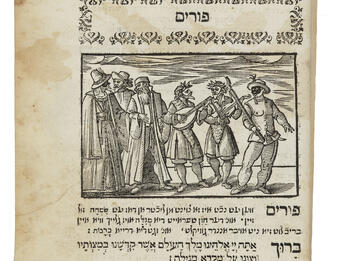The Innkeeper’s Love Song
Immanuel Frances
17th Century
O you paragon of glory and grace, listen to the call of Papos and his cry! He is bellowing like a bull, braying at you like a donkey, for you are his cow and his she-ass. His heart is already parched like grain, he and his passion are impaled on love’s spit like a roast.
Look through your lattice, gazelle, and observe his sorry figure: his face has…
Creator Bio
Immanuel Frances
The Italian rabbi and poet Immanuel Frances, brother of the poet Jacob Frances, led a difficult life, wandering extensively and suffering misfortunes. His poetic career can be divided into three periods. In the first, 1643–1660, Frances was influenced by two popular Italian poets, Torquato Tasso and Battista Guarini. Frances composed love poems and debates about various topics, including women and rabbis. He also attacked corruption in Jewish society. In the years 1664–1667, he and his brother Jacob engaged in a literary war against Shabbetai Tzvi and kabbalah, which they saw as a threat to the Jewish people (they composed a volume of satirical poems, Tsevi mudaḥ (Banished Deer). Following the death of his brother in 1667, Immanuel led a solitary life, devoting himself to his work as a rabbi of Florence and composing religious poetry. He also wrote some Latin poems, which have not survived, and a number of responsa. Immanuel’s most famous work is Metek sefatayim (Sweetness of the Lips, 1667), concerning Hebrew poetry, which he wrote in Algeria. He also compiled, revised, and published a number of his brother’s poems.
Related Guide
Early Modern Italy: Where East and West Meet
Ashkenazim, Sephardim, and Marranos encountered each other in Italian cities, developing community structures that later influenced Jewish communal organization throughout the western world.
Related Guide
Early Modern Jewish Languages
As Ashkenazi and Sephardi Jews migrated eastward, Yiddish and Ladino emerged as distinct languages. Both languages developed literary traditions, as print became more widespread.
Related Guide
Early Modern Literature and the Arts
Jewish literary creativity flourished in the early modern period, dominated by Hebrew poetry that blended religious themes with Renaissance forms.
You may also like



